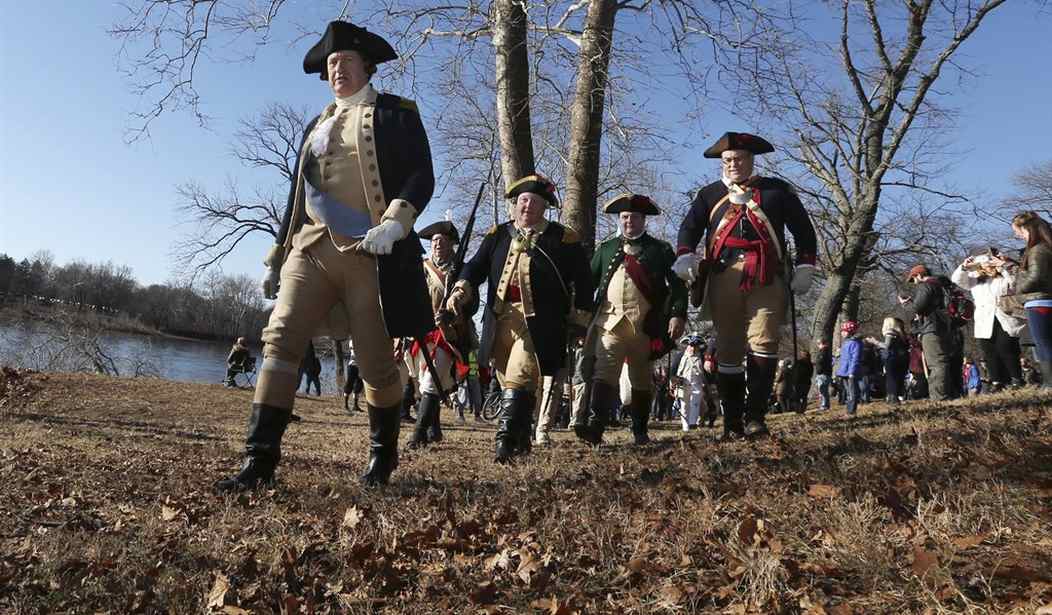For George Washington, Christmas was not always a happy day. As a boy of eight, his home burned down on Christmas Eve. Serving in the British Army in 1753, he was shot at in a miserable, freezing village called “Murdering Town.”
General Washington watched helplessly during Christmas 1777 in Valley Forge as his men perished in extreme conditions while preparing to cross the Delaware River on Christmas night to surprise the British at Trenton.
But for General Washington, Christmas of 1783 was pure joy. In September, the Treaty of Paris was signed, formally ending the war with England and fulfilling the patriot dream of independence from political and religious tyranny.
Washington resigned his commission as Commander-in-Chief of the Continental Army on December 23. Pointing his horse toward Mount Vernon the next day, he was now just a citizen, his new country an ideal come true, and Martha was preparing a feast of Yorkshire Pie with game and nutmeg, and her famous Great Cake of sugar, butter, and fruit.
In late 1783, other founders were reviewing the work of English jurist William Blackstone. His presentations of the moral law, Judeo-Christian values and their importance to governance and legal systems were the underpinnings of what became the United States Constitution. The key component in Blackstone’s Commentaries on the Laws of England is that natural law—the freedom that comes from God and God alone—must be the cornerstone of any institution seeking individual liberty over the heavy hand of government.
Recommended
That December, as the General celebrated his hard-fought liberty and founders contemplated the paramount importance of unbridled religious expression, it is unlikely they could envision the attack on religious freedom on display in modern America.
Blackstone stated, “the law of nature, equal with mankind, dictated by God himself, is superior in obligation to any other. This natural liberty … (is) a right inherent in us as birth, and one of the gifts of God to man at his creation.”
Even during the founding document drafting stages of the post-Revolution 1780s, all three branches of American government were being crafted on Godly, faith-based principles. Blackstone and the Founders rightly believed God conferred liberty and the exercise of reason and choice on the individual person, and as no earthly government was more powerful than the Creator, no earthly government had any right to separate an individual from personal liberty.
Although the Constitution is designed to protect religious freedom from censorship, the left is determined to block any public display of faith. December always brings a new round of atheists or liberal politicians demanding the removal of a nativity scene or Christmas tree.
The cultural fight against religious freedom is demonstrated by American retailers willing to take our money and our religious expression all at the same time. Without Christmas gift-giving, there would be no holiday shopping rush, yet Starbucks goes with “Merry Coffee” on its cups and Targetrefuses to let Salvation Army bell ringers collect money for the homeless and hungry on its property.
With the exception of a few retailers like Hobby Lobby, Home Depot and Walmart who use “Christmas” unabashedly in December advertising, most avoid the word entirely, choosing “holiday” and a secular version of red and green images. It is ironic that online shoppers alone spent $122 billion last December with Christmas-avoiding retailers in the modern version of commemorating gifts the Three Wise Men brought to the baby Jesus.
There was some good news for religious freedom in 2019. In April, the U.S. Court of Appeals for the D.C. Circuit Court ruled that the Chaplain to the U.S. House of Representatives did not have to allow an atheist to give an oxymoronic secular “prayer” on the House floor. The American Civil Rights Union wrote an Amicus Brief to the Supreme Court in support of keeping the 1925 World War I Bladensburg, Maryland Peace Cross after atheists had demanded its removal, and SCOTUS found in favor of ACRUs position on the cross and against perpetually offended atheists.
Blackstone’s instruction, the Founders’ wisdom and Washington’s simple Christmas joys remain a source of encouragement and guidance for our nation today. We are still a country founded on individual liberty over the tyranny of government. We still band together as citizens to celebrate our founding as a nation directly under God, and to embrace the natural law of the Creator, and our Constitution.
But we still have a clear view of tyrants in our midst.
As we celebrate the birth of our Savior, we also must give thanks to God for guiding the birth of our nation. Every freedom is inextricably tied to the other; the loss of one is the loss of all—a history lesson we must never forget.
Kerri Toloczko is a Senior Fellow with The American Civil Rights Union, a non-partisan, non-profit public policy organization dedicated to protecting the constitutionally-protected civil rights of all Americans.
























Join the conversation as a VIP Member